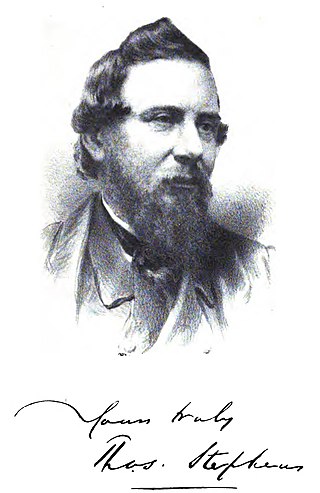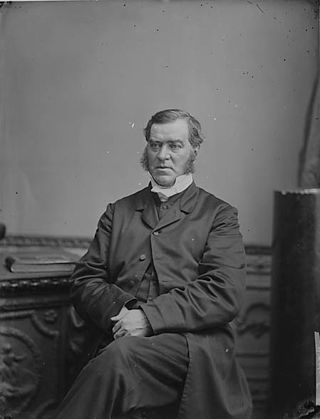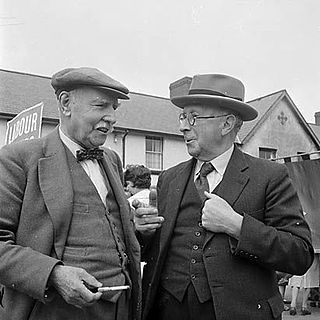This article is about the particular significance of the year 1970 to Wales and its people.
This article is about the particular significance of the year 1959 to Wales and its people.
This article is about the particular significance of the year 1957 to Wales and its people.
This article is about the particular significance of the year 1953 to Wales and its people.

Thomas Stephens was a Welsh historian, literary critic, and social reformer. His works include The Literature of the Kymry (1849,1876), Madoc: An Essay on the Discovery of America by Madoc ap Owen Gwynedd in the Twelfth Century (1858,1893), and Orgraff yr Iaith Gymraeg (1859), as well as a number of prize-winning essays presented at eisteddfodau between 1840 and 1858. He was the first Welsh historian and literary critic to employ rigorous scientific methods, and is considered to have done more to raise the standards of the National Eisteddfod than any other Welshman of his time. Stephens also figured prominently in efforts to implement social, educational and sanitary reforms both locally in Merthyr Tydfil and more broadly throughout Wales.
This article is about the particular significance of the year 1948 to Wales and its people.
This article is about the particular significance of the year 1943 to Wales and its people.

William Ambrose, whose bardic name was Emrys, was a 19th-century Welsh-language poet and preacher. Many sermons of his were published and some of his poems used as hymns.
This article is about the particular significance of the year 1930 to Wales and its people.
This article is about the particular significance of the year 1922 to Wales and its people.

Reverend Rowland Williams, commonly known by his bardic name "Hwfa Môn", was a Welsh clergyman and poet, who served as Archdruid of the National Eisteddfod of Wales from 1895 to 1905.
William Evans, better known by his bardic name of Wil Ifan, was a Welsh poet who served as Archdruid of the National Eisteddfod of Wales from 1947 to 1950.
This article is about the particular significance of the year 1898 to Wales and its people.
This article is about the particular significance of the year 1887 to Wales and its people.

Thomas Evan Nicholas, who used the bardic name Niclas y Glais, was a Welsh language poet, preacher, radical, and champion of the disadvantaged of society.

Howell Elvet Lewis, widely known by his bardic name Elfed, was a Welsh Congregational minister, hymn-writer, and devotional poet, who served as Archdruid of the National Eisteddfod of Wales from 1924 to 1928.

John Cadvan Davies (1846–1923) was a Wesleyan Methodist Minister and a Welsh poet, who served as Archdruid. He is better known in Wales by his bardic name, Cadfan.

The Reverend John Davies was a Welsh Congregational Minister, writer, linguist and poet. One source has Davies' date of death listed as 10 December 1884, separately noting that it was his funeral service that was conducted on 16 December 1884.
Mary Jane Evans was a Welsh teacher, preacher and actress, best known for her solo recitations and dramatic monologues.
Rhiannon Davies Jones was a Welsh historical novelist, lecturer and Welsh nationalist who wrote in Welsh. Educated at University College Bangor, she won two prizes for short novels, two Prose Medals at the National Eisteddfod of Wales and the crown at the 1973 Anglesey Eisteddfod. Jones published ten novels with her works covering fictional diaries, her political beliefs and responses to political events, and Welsh kings and princes.







